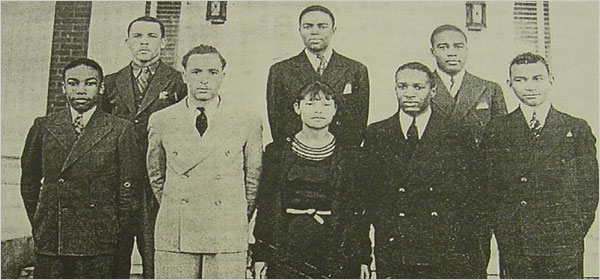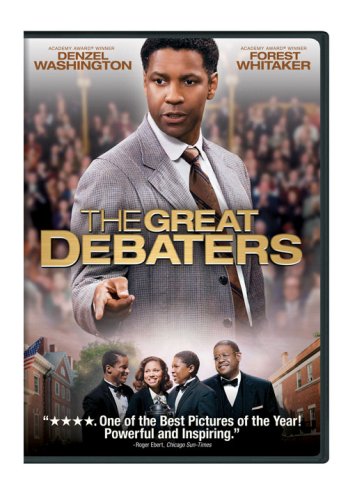By: Mercedes Mack
“Who is the judge?”
“The judge is God.”
“Why is He God?”
“Because He decides who wins or loses. Not my opponent.”
“Who is your opponent?”
“He does not exist.”
“Why does he not exist?”
“Because he is a mere dissenting voice of the truth I speak!”
c. 2007, Directed by Denzel Washington. A biopic based on the true story of Melvin B. Tolson (Denzel Washington), a professor at Wiley College, Texas. Set against the backdrop of Jim Crow Texas, the film depicts the journey of the Wiley College debate team, created and coached by Tolson into a nearly undefeated season that included the first debate between white and African American students in the U.S. But that’s not why this movie is awesome.
This movie is awesome because at first glance, the film is a classic underdog tale of Wiley College debate team set in the backdrop of the Jim Crow South with caliber acting and very resilient characters. Looking closer, there is an obvious undercurrent of nonviolent resistance and the tough recurring question of what do we have to do versus what we can or want to do.
There are multiple scenes in the film that address these questions- the secret meetings led by Professor Tolson, when Dr. James Farmer hits a white farmer’s pig, and other segregation-violence topics addressed in various debates. In the film, these questions are constantly contemplated as characters navigated the Jim Crowe system and each grappled with how they could change it.
One of my favorite scenes in the movie is the final debate between Wiley College and Harvard. Their debate topic is- Civil disobedience is a moral weapon in the fight for justice. A relevant topic in 1930 as dialogues, such those shown in the debates, were the beginnings of what would evolve into the battle cry of the Civil Rights Movement about 20 years later. The prompt was given to students as a last minute change, and in preparation, they decide whether or not to include Gandhi’s method of satyagraha-
l think we should get into Gandhi’s concept of Satyagraha.
l don’t agree.
l don’t think people are gonna understand what–
what– Sadagara?
Sactchmaget? Sactchma–
Satyagraha. From the Sanskrit. Meaning truth and fairness.
It is very true that many people don’t. As a student of nonviolence myself, I still sometimes grapple with understanding the deep implications of satyagraha. Michael Nagler describes satyagraha as, “A positive and spiritually based form of resistance that starts in the heart of the resistor and inevitably produces creative action.”. It’s true that everyone’s truth differs-my truth may not necessarily align with someone else’s opinion of truth. Truth always finds its root in justice and integrity. A good litmus test to whether or not your truth aligns with the “truth” promoted in satyagraha is asking yourself if it’s concerned with upholding human dignity.
Satyagraha’s truth ties into another main theme of the film- the morality and justice of the law. St. Augustine was referenced several times in the film, most notably for his famous observation, “an unjust law is no law at all”. In his Letter from a Birmingham Jail, Dr. Martin Luther King Jr. clarifies his inner truths drawn from Gandhi’s teachings of satyagraha and and contextualizes it using the classic political and spiritual philosopher St. Thomas Aquinas.
A just law is a man made code that squares with the moral law or the law of God. An unjust law is a code that is out of harmony with the moral law. To put it in terms of St. Thomas Aquinas: An unjust law is a human law that is not rooted in eternal law and natural law. Any law that uplifts human personality is just. Any law that degrades human personality is unjust.
The debate scene between Harvard and Wiley address the “radical” implications the misconception of nonviolence carries. Nonviolence is sometimes misunderstood to be inherently anarchistic because civil disobedience involves picking and choosing which laws to obey and thus cannot be moral.
In rebuttal of the anarchistic argument, Wiley argued:
Gandhi believes one must always act with love and respect for one’s opponents,even if they are Harvard debaters. [laughter] Gandhi also believes that lawbreakers must accept the legal consequences for their actions. Does that sound like anarchy?
This examination is on point and simply put. Gandhi himself accepted jail-time many times as a part of participating in India’s independence movement. Laws are broken, not randomly, but with specific intent-chosen because they are inherently unjust and must be changed for the benefit all people. From this, participating in nonviolence is the greatest act of love and democratic participation for humankind that is possible.
 1930 Wiley College Debate Team
1930 Wiley College Debate Team
Students from the debate team went on to actively participate in the Civil Rights Movement. James Farmer Jr. went on to found the Congress of Racial Equality and become a leader in the Civil Rights Movement.
Film critics claimed I would, “Stand up and cheer!”. And I did.
If you would like to learn more about the Wiley College Debate team, I suggest Brad Osbourne’s documentary The Real Great Debaters.









